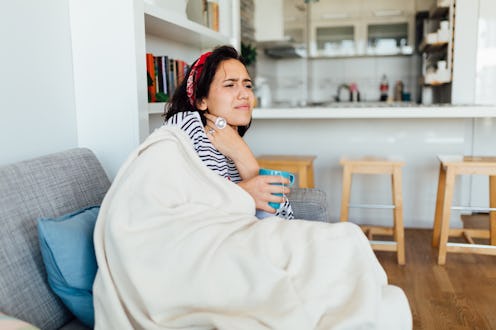Life
What To Do When It Feels Like Your Period Is Incapacitating

Ahh, the joys of being a woman! For the small price of being subject to constant harassment, unnecessary comments about our bodies, and only being paid about 77 cents on the dollar, we get to bear the world’s children and, once a month, have our hormones freak out while our bodies expel a part of themselves. Lucky!
Every woman experiences her period differently. Some have barely any symptoms at all, but for others, the period pain can be so overwhelming that you feel temporarily incapacitated. Many women have had, at one point or another, a period that lays us low — one that makes us feel like our uterus is collapsing in on itself like a dying star, and that sends us burrowing into our sheets with a family-size bag of Reese’s Pieces, to writhe and cry and groan and ask the heavens what we ever did to deserve to such pain. If you’ve ever experienced this, here are some tips for making your period slightly less awful.
First, a brief review: over the course of one’s menstrual cycle, the lining of the uterus (the endometrium) thickens to support a possible pregnancy. If you don’t get pregnant that month, the lining isn’t needed, so your body sheds the extra lining by contracting and squeezing it out. This is when we get our periods, and this is what causes the nausea, cramping, and desire to scream into the pillow.
Fortunately, there are a lot of ways to manage period symptoms. Different things may or may not work for different people, so try them out, and see what’s best for you. And when in doubt, keep a bag of Reese’s Pieces on hand.
Eat more of certain foods.
Although I stand behind my Reese's Pieces prescription 100 percent, actual scientists who didn't get a C in sophomore chemistry suggest eating foods that reduce inflammation can help when you're on your period. These include nutrient rich veggies like kale and broccoli, as well as pineapples, bananas, salmon, and walnuts.
Drink more water.
Drinking lots of water is always good for you, but especially on your period. Staying hydrated can help with bloating and fatigue, and aid with digestion.
Get a heating pad.
Heat can increase blood flow and reduce cramping, so placing a heating pad or a hot water bottle on your lower stomach, or soaking in a warm bath should relieve some of the pain.
Take pain medicine.
Sometimes, when the pain gets to be too unbearable, it's time to bring in some chemical reinforcement. Over-the-counter pain medication such as ibuprofen (found in Advil) can help manage the pain. These work best when you stay ahead of the pain, so try to take them before the pain gets too bad.
Exercise.
I know, I know. When you feel bloated and slushy and like a walking cramp, the last thing you want to do is lace up your running shoes and take your achy body for a jog. But exercise can actually help ease the pain of cramps, and the endorphins released can boost your mood. Here are some tips for exercising while you have your period.
Have an orgasm.
This is probably the most enjoyable way to deal with period pain. Whether it's period sex, or some just some private time in that hot bath you drew, having an orgasm increases blood flow and releases endorphins that relieve pain, migraines, and decrease irritability.
Give yourself a massage.
Or better yet, get someone else to do it. Massaging the lower back and abdomen will relieve the pain and if nothing else, make you feel slightly less miserable.
Look into birth control pills.
If your period is heavy and irregular, talk to your doctor about taking birth control pills. The Pill is known to regulate your period, decrease menstrual cramps, and even help with acne.